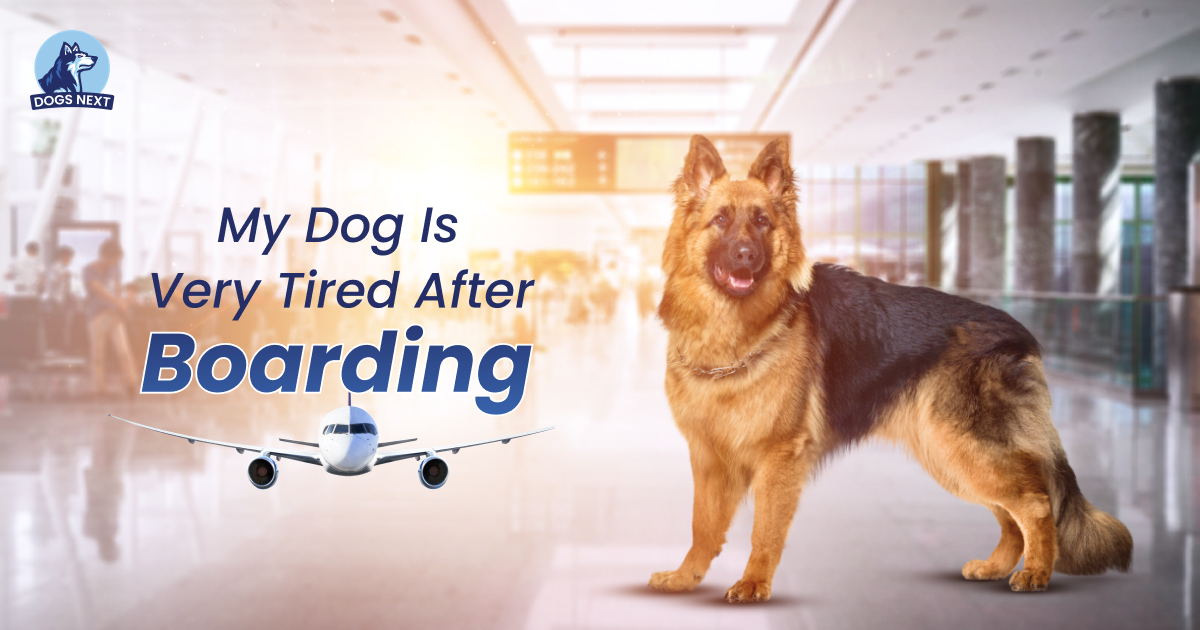It is not uncommon for dogs to feel tired or fatigued after boarding. The experience of being in a new environment, surrounded by unfamiliar people and other dogs, can be mentally and physically draining for them. Additionally, the change in routine, sleeping arrangements, and increased activity can contribute to their tiredness.
How can you help your pup feel better after boarding? This article discusses the reasons behind your pup feeling tired after boarding.
Table of Contents
Why My Dog Is Very Tired After Boarding?
The experience of boarding a dog can be stressful, especially if they are away from their regular routine and in a strange environment. A tired dog after boarding can be caused by some common issues, the following issues are:
Stress and anxiety: A new environment or being away from their owners can cause anxiety and stress in dogs. Their bodies and minds can become exhausted as a result of stress.
The routine has changed: Changes in their routine can be exhausting and disorienting to dogs who thrive on routine. It is possible for your dog to feel tired and overwhelmed when you move him into a new environment with different feeding and exercise routines.
An increase in activity: The exercise and playtime that dogs receive while boarded may be greater than those they receive at home. Despite the benefits of increased activity, if they aren’t used to it, they may become exhausted.
Getting too little sleep: A dog that sleeps in its owner’s bed or suffers from separation anxiety may have trouble sleeping in a new environment. As a result, they may become exhausted and incapable of getting enough sleep.
An injury or illness: An unnoticed illness or injury during boarding may cause a dog to feel tired after boarding. In the event that you notice any symptoms that are concerning to your dog, it is important for you to seek veterinary care immediately.
In general, a dog feeling tired after boarding can be due to a variety of factors. It is normal for your dog to be fatigued after a long stay away from the home, however, you should pay attention to his behavior and seek help from a veterinarian if you have any concerns about his health and well-being while away from home.
How does boarding affect a dog’s energy levels?
You might wonder if it’s normal for your dog to come home tired after boarding.
At boarding, your dog will be exposed to a variety of activities. You can see and do so much more than just dogs!
The excitement of boarding can make your dog tired after coming home. Preparing a quiet, cozy place for him, such as his crate, will mainly help him sleep it off. You should keep an eye out for signs of stress or illness if your dog seems utterly exhausted after boarding.
Diarrhea after boarding, Is it normal for a dog?
Diarrhea is a common issue that can occur in dogs after boarding, especially if they have experienced stress or a change of usual routine. Diarrhea can be caused by a variety of factors, such as a change in diet, exposure to new viruses or bacteria, or anxiety.
If your dog has diarrhea after boarding, it’s important to monitor them closely and make sure they stay hydrated. You can help prevent dehydration by providing fresh water and electrolyte solution
A grudge might be brewing between them
Has your dog developed a dislike for you after being boarded? Do you find him acting totally disconnected from you when he gets home?
There is nothing more emotional than a dog. It might be pretty hard for your dog to accept that you left him at boarding for so long.
Perhaps he is holding a grudge as a result of his exhaustion.
How traumatic is it to board a dog?
Both of you may feel stressed when you have to leave your dog behind. Do you think your dog could suffer trauma if he’s boarded?
The dogs in these facilities do well in some and do not in others. The dog plays a major role in this!
Dogs’ experiences will also be influenced by the facility you choose. Before choosing a facility, make sure you do your research. During an interview, inquire about the staff-to-dog ratio and how their dogs are treated.
Your role as your dog’s advocate should not be underestimated! The safety of the facility you choose is your responsibility.
Tips for helping your dog recover from boarding
There are several ways you can help your dog recover after boarding and get back to his normal routine if he feels tired or out of sorts. The following tips can help you:
- Relax your dog as much as possible: The importance of giving dogs time to rest and recover after a period of intense activity cannot be overstated. There should be a comfortable, quiet place in which your dog can relax and sleep so they will be able to relax and rest in peace.
- Stimulate the mind: There is no doubt that dogs need to be mentally stimulated as well as physically exercised. This can be accomplished by such things as offering your dog puzzle toys, toys that dispense treats, or other toys that require your dog to solve problems while playing.
- Reintroduce your dog’s normal routine gradually: There is nothing more important than getting your dog back into his or her normal routine as soon as possible since dogs thrive on routine. Taking small steps towards establishing your new routine is beneficial, such as feeding them at their usual time of the day or going for a short walk around the same time each day.
- Exercising gradually: To prevent injury or exhaustion, you should gradually increase your dog’s activity level before boarding if he or she isn’t used to exercising. Over time, gradually increase the intensity and duration of walks or play sessions.
- Don’t forget to show your love and attention: You should spend as much time as possible with your dog after boarding to ensure that he or she gets the attention and love he or she needs. The home environment can be made more comfortable and secure for them by doing this.
Overall, the key to helping your dog recover from boarding is to provide them with plenty of rest, mental stimulation, and gradual re-introduction to their regular routine. By being patient and supportive, you can help your dog bounce back from their stay away from home and get back to their happy and healthy self.
Be aware of other symptoms of illness as well
Keeping an eye on your dog while boarding can help you determine whether he’s sick from boarding.
Your dog may experience more than just exhaustion. Make sure you call your vet right away if he shows any other signs of illness.
Canines can pass on many diseases and illnesses to one another. In order to get your dog the treatment he needs, take your dog to the vet so he can be diagnosed and treated.
What makes a good boarding facility?
In addition to feeling tired after boarding, there are some signs that indicate more serious health issues. These signs are usually associated with being in a new environment or having physical activity. Watch out for these signs:
Fatigue: The excessive fatigue your dog exhibits and their lack of interest in typical activities may be a sign of a more serious health problem.
Feeling hungry but not eating: Your dog may require medical attention if she doesn’t eat at all or eats only a small amount.
Diarrhea or vomiting: Infections and parasites can also cause these symptoms, ranging from minor stomach upsets to more serious conditions.
Breathing difficulty or coughing: In addition to these symptoms, there could be other health issues that are requiring attention.
It’s a fever. It may suggest that your dog has an infection or another health problem if their temperature is elevated.
There are a number of symptoms that you might notice in your dog, if you notice any of them, you should seek the advice of your veterinarian. If there is an underlying health issue that needs to be diagnosed and treated, they can be of great assistance. There’s always a risk of getting sick after boarding, so it’s better to be careful and get medical attention if you have any worries.
When to call a vet about post-kennel lethargy
After boarding a dog at a kennel, dogs commonly experience a condition known as post-kennel lethargy, which is typically a temporary condition.
Nevertheless, if your dog appears to be lethargically affected by post-kennel lethargy, you should contact your veterinarian as soon as possible. It is important to seek veterinary care when one of the following situations occurs:
- Lethargy to the point of exhaustion: The excessive lethargic behavior, unresponsiveness, or weakness of your dog could indicate a serious problem.
- Appetite loss: It is very possible that your dog is suffering from an underlying health condition if he or she does not eat or drink for more than one or two days.
- Diarrhea or vomiting: This could be a sign that your dog is suffering from an underlying health issue or infection if he or she is vomiting or having diarrhea for more than a few days.
- Breathing difficulties: It could be an indication of a respiratory infection or another serious health issue if your dog is having difficulty breathing or is coughing.
- Symptoms that persist: This can be a warning sign that your dog may have a more serious underlying health issue if the symptoms persist for more than a day or two.
It’s important to contact your veterinarian if your dog displays any of these symptoms. Providing appropriate treatment for underlying health issues is one of their responsibilities. It’s also a good idea to seek veterinary care whenever you are unsure about your dog’s health.
Common Issues After Boarding for Dogs
| Topic | Causes | Symptoms | Preventative Care | Treatment |
| Tiredness | Stress, anxiety, change in routine, physical exertion | Lethargy, decreased activity, sleeping more than usual | Seek veterinary care, follow the treatment plan as prescribed | Rest and relaxation, monitoring for other symptoms |
| Dehydration | Lack of access to fresh water, physical exertion | Excessive panting, dry mouth, sunken eyes, lethargy | Ensure access to fresh water at all times, monitor for signs of dehydration | Offer fresh water, electrolyte solutions, or seek veterinary care in severe cases |
| Illness | Exposure to viruses or bacteria, underlying health conditions | Diarrhea, vomiting, loss of appetite, lethargy | Ensure vaccinations are up to date, choose a reputable boarding facility | Choose a reputable boarding facility, ensure adequate supervision and safety measures, and provide emergency contact information |
| Anxiety | Separation anxiety, unfamiliar environment, lack of exercise | Excessive barking, destructive behavior, panting, trembling | Provide familiar items from home, choose a boarding facility that offers extra exercise and socialization, consult with a veterinarian | Behavioral therapy, medication, training, and environmental changes |
| Injury | Physical trauma, rough play, inadequate supervision | Limping, difficulty walking, swelling, pain | Seek veterinary care immediately, follow the treatment plan as prescribed. | Seek veterinary care immediately, and follow the treatment plan as prescribed. |
It’s important to choose a veterinarian with experience and a good reputation to ensure that your dog receives the best possible care.
Conclusion
Several factors can contribute to dogs feeling fatigued while in a boarding facility because the experience can be extremely stressful and emotionally draining to the dogs. In an unfamiliar environment, you may experience exhaustion because you do not have your normal routines and comforts.
A dog’s fatigue can also be increased by boarding facilities that are noisy and active. The important thing to remember is to give your dog extra attention and affection after they return home, as well as a quiet and comfortable space.
A veterinarian should be contacted if your dog is still tired or seems unwell after a few days, as it may mean he or she needs advice and treatment that might help.

I’m David, an expert contributor and writer, with two furry friends of my own, I know the challenges of raising and caring for dogs. From training to nutrition and health, my goal is to provide valuable insights and advice to help create strong bonds and happy, healthy lives. Find me in Twitter.




